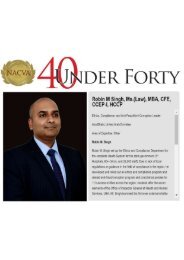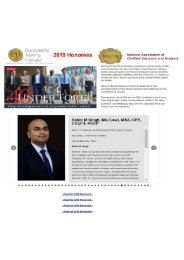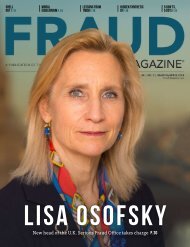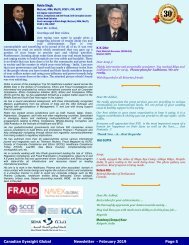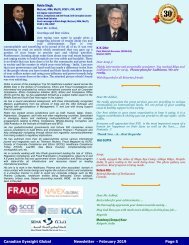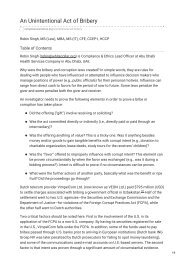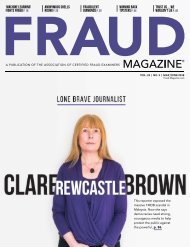COMMON PITFALLS DURING A FRAUD INVESTIGATION BY ROBIN SiNGH
COMMON PITFALLS DURING A FRAUD INVESTIGATION by #RobinSingh the #whitecollarinvestigator
COMMON PITFALLS DURING A FRAUD INVESTIGATION by #RobinSingh the #whitecollarinvestigator
You also want an ePaper? Increase the reach of your titles
YUMPU automatically turns print PDFs into web optimized ePapers that Google loves.
JUNE 2014<br />
WWW.INTERNALAUDITOR.ME<br />
Anti-Corruption Programs are Essential<br />
to Companies in the Middle East<br />
As the Use of Social Media Increases<br />
so do the Associated Risks<br />
INTERN AL AUDITO R<br />
MID DLE E A S T<br />
Internal Audit as a Tool to Increase the<br />
Value of Portfolio Companies<br />
CLIMBING TO THE TOP<br />
How ENOC’s internal audit<br />
department became a valued<br />
business partner<br />
I N SIGHT S ON GOV ERNANCE, R ISK MANA GEM ENT AND CONTROL
Fraud Risk<br />
TO COMMENT on the article,<br />
EMAIL the author at drobinsingh@gmail.com<br />
<strong>BY</strong> DR. STEVEN HALLIDAY<br />
<strong>BY</strong> <strong>ROBIN</strong> SINGH<br />
<strong>COMMON</strong><br />
<strong>PITFALLS</strong><br />
<br />
<br />
<strong>INVESTIGATION</strong><br />
Experience has demonstrated that<br />
amongst the mistakes that can<br />
befall an investigation four common<br />
mistakes in handling fraud allegations<br />
routinely occur. These pitfalls include: not<br />
investigating at all, not conducting the<br />
investigation under attorney-client privilege,<br />
not using independent investigators<br />
and not following a strict investigative due<br />
process.<br />
1. Failing to investigate<br />
EDITED <strong>BY</strong> JAMES TEBBS<br />
Investigative inaction is one of the most<br />
serious errors management can make when<br />
faced with fraud allegations. This inaction<br />
can be the result of sheer negligence or due<br />
to a more sardonic, deliberate judgment. In<br />
many instances, organizations- particularly<br />
charitable and public-service agencies-are<br />
staffed by individuals who can’t fathom<br />
that someone on staff might exploit their<br />
shared cause for personal benefit. On other<br />
occasions, personalities and corporate<br />
internal rivalries stand in the way of initiating<br />
proper investigations. No aspiring<br />
executive wants to answer for fraud that<br />
went on under their leadership.<br />
2. Attorney-client privilege<br />
The law does not readily protect investigative<br />
findings from unnecessary disclosure,<br />
particularly in the Middle East. An effective<br />
way to protect findings from disclosure<br />
to opportunistic plaintiffs and government<br />
agencies is through the utilization of attorney-client<br />
privilege. This is done by having<br />
a lawyer co-lead the investigation with<br />
an “experienced” investigator. Forensic<br />
accountants and other crucial members of<br />
the investigative effort should report to the<br />
lawyer.<br />
In a privileged environment, management<br />
can be confident it will have proper time<br />
to manage the disclosure of the sometimes<br />
dramatic findings discovered by forensic<br />
accountants. Similarly, forensic accountants<br />
may identify issues beyond the scope of<br />
the original investigation, and disclosure<br />
of these issues may not be relevant to the<br />
investigation at hand. By operating in a<br />
privileged environment, firms can address<br />
unexpected and unrelated findings without<br />
unnecessary or premature disclosure.<br />
Further, a privileged investigation can<br />
best enable the release of findings at the<br />
discretion of the party/company involved.<br />
This is far more advantageous than large<br />
scale disclosures of information which can<br />
be misconstrued by the public, the media<br />
or government agencies.<br />
3. Engaging independent<br />
investigators<br />
Federal prosecutors routinely assign more<br />
credibility to investigations that are led<br />
by outside specialists rather than those<br />
conducted by in-house counsel, unless<br />
this function is independent of the line<br />
management. Furthermore, Using external<br />
specialists also allows for access to the latest<br />
investigative techniques and technologies,<br />
as well as deeper experience than may<br />
be retained in-house.<br />
4. Following investigative due<br />
process<br />
Conducting any investigation requires a<br />
disciplined and well executed approach to<br />
ensure evidence is gathered, securely maintained<br />
and correctly interpreted.<br />
For example, voice recording interviews<br />
is not permissible under certain state laws<br />
in the United States also in other countries<br />
(including countries in the Middle<br />
East unless it is done with the consent of<br />
the interviewee in good faith). There are<br />
several high level mistakes investigators<br />
make while conducting interviews and<br />
taking statements, including making sure<br />
the correct procedures are adhered to, or<br />
making sure statements are accurate and<br />
reliable. Furthermore, investigators need to<br />
ensure they conduct interviews in a logical<br />
sequence – for instance interviewing a<br />
suspect after finishing interviews with the<br />
witness. Another example is working on<br />
copies of evidence rather than on the original<br />
evidence itself. This brings the issue<br />
of tampering with evidence into question<br />
in the fact that the investigator has altered<br />
that evidence since it was collected and it<br />
will not be in its original form if it were to<br />
need to be looked at again or used in court.<br />
Conclusion<br />
Fraud is clearly undesirable, and having to<br />
investigate them can be costly and a drain<br />
on corporate resources. The findings can be<br />
embarrassing and expensive to a company<br />
in the short term. However, avoiding the<br />
mistakes mentioned above will assist in<br />
making sure that a company or client never<br />
makes a far more costly and embarrassing<br />
appearance in legal courts for failing to<br />
conduct a proper investigation, and may<br />
help to avoid negative public perception.<br />
<strong>ROBIN</strong> SINGH, MBA, MIT, CFE, CFAP is Senior<br />
Ethics / Fraud Control Officer at Abu Dhabi<br />
Health Services Company (SEHA).<br />
28 INTERNAL AUDITOR - MIDDLE EAST<br />
JUNE 2014







